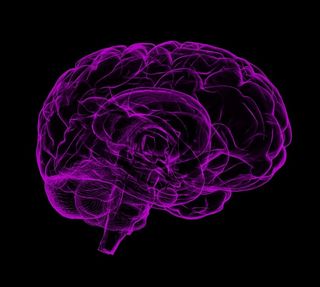Psychosis
Schizophrenia Is a Brain Disease
It should be classified with other brain diseases including Alzheimer’s Disease.
Posted January 17, 2019

Schizophrenia is a physical disease of the brain characterized by an imbalance of neurotransmitters and damaged brain tissue.
Other diseases of the brain, such as Parkinson’s Disease, Alzheimer’s Disease, stroke and brain tumors also involve changes in brain tissue. In Alzheimer’s Disease, structures called plaques and tangles cover the brain and alter normal function.
About 50% of individuals with Parkinson’s Disease struggle with psychosis that often looks like schizophrenia. Schizophrenia commonly presents like an early onset Alzheimer’s Disease, with a break from reality and cognitive deficits. Despite these similarities, schizophrenia is still called a mental illness while other brain diseases are classified as physical.
With time, the classification of brain diseases has changed. Seizures used to be called a mental illness. Women with behavioral effects from hormonal changes were often diagnosed with “female hysteria,” which is no longer considered a disease.
People with Alzheimer’s Disease, Parkinson’s Disease and stroke, which are all considered physical illnesses are generally not held responsible for odd or menacing behavior which can be symptoms of the illnesses.
Several years ago, at a church, I met a former professor who had developed Alzheimer’s Disease. She had become incapable of working at the university but did not know it. When she continued visiting certain classrooms and returning to her old office, which was now occupied by another professor, the university contacted her spouse. He made sure she did not travel to the campus again. No legal action was taken.
When the professor with Alzheimer’s Disease obtained medical help, her former colleagues consoled the family, calling to mind her many productive and memorable years at the university.
Had this teacher been considered “mentally ill” things may have turned out very differently.
I began to behave like this professor in 2002, during my first psychotic episode. As a college student in 1999-2001, I scored high grades in classes like Advanced Biochemistry and Physics. After schizophrenia took hold of my life, I could no longer study and failed my classes. Unaware that I was totally disabled, I hid in university campus libraries and lounges, believing I was unconditionally welcome there.
Eventually, even while dirty and hallucinating, I clung to my belief that the university was proud of me. I remembered who I used to be: the researcher, the violinist, and the honors student. Like the professor, I could not acknowledge or accept that anything had changed.
For three years, I lived a terrible life, eating food from trash cans, hiding on campus in lounges and bathrooms, and relying on public restrooms for my personal hygiene.
After three and a half years homeless, although I was dirty, I was still a regular on the university campus, spending much of my time in libraries and lounges. Finally, Los Angeles police officers picked me up on the university campus and threw me in jail. My crime: trespassing on the campus of a university where I had once been an honors student. I was behaving like the professor.
If I had been diagnosed with Alzheimer’s Disease, I would have been treated with compassion, and I would not have been taken to jail. Trained medical staff would have worked with my family and friends to discuss and implement the best treatment option for my highest level of recovery.
But legal regulations prevented me from being picked up and encouraged to begin seriously needed medical treatment for my schizophrenia. Unless I was “a danger to myself or others,” police left me on the street due to protocol. I had to become severely ill before I was finally forced to obtain help.
In my case, I suffered for a period of four years before being picked up for evaluation, after I had become severely disabled. In my illness, I insisted on separation from all family and friends. When I was evaluated, my condition had deteriorated. I had been hearing voices every day at all times and sleeping in a churchyard every night for thirteen months.
In Parkinson’s Disease, Alzheimer’s Disease and other diseases of the brain, early intervention is considered important. Early intervention is also important in schizophrenia. However, many people suffer for years while the disease progresses before they are sick enough to qualify for evaluation without consent.
When schizophrenia is referred to as a mental illness, it may imply that odd behaviors are a choice, and not necessarily a physical problem that requires treatment.
This perpetuates the social stigma of schizophrenia.
Thankfully, antipsychotics greatly improved my quality of life and allowed me to work and study again. Like a patient with Parkinson’s psychosis, I could not control my behavior until I began taking antipsychotics, but treatment offered healing and hope.
It is my dream that someday, people described as mentally ill will be shown the understanding and compassion that is offered to individuals with all other diseases of the brain. Schizophrenia is a brain disease. Individuals with schizophrenia should undergo medical treatment instead of incarceration.
Early intervention in schizophrenia is key to achieve the highest level of recovery.




